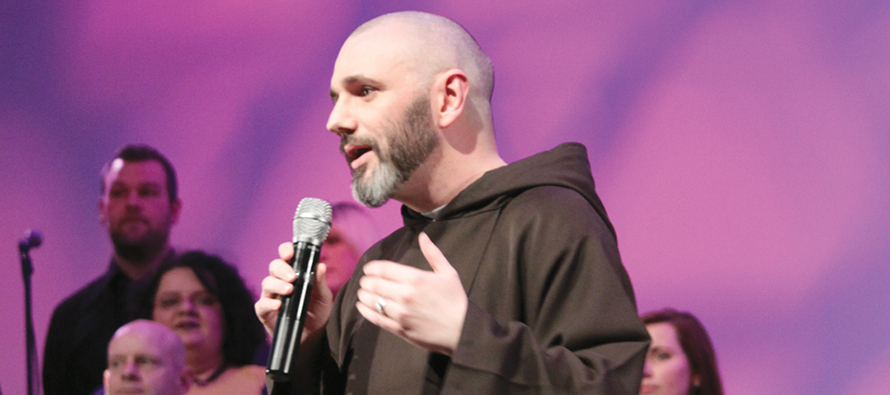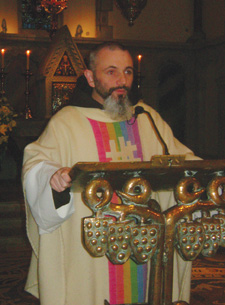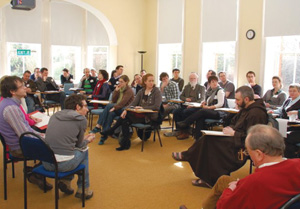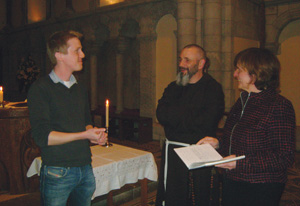Beginning again in Ireland

Image: Father Richard Hendrick, O.F.M. Cap. speaks at the end of a prayer service featuring the Dublin Gospel Choir.
"How were you able to tell the time on that clock?” whispered the high-school student, genuinely puzzled. “It had no hands or numbers.” The teenager was pointing to the empty monstrance sitting on the altar. Just a few moments earlier it had held the Blessed Sacrament during a prayer service for her class.
“I remember that moment clearly,” says Father Richard Hendrick, an Irish Capuchin Franciscan friar. “The student thought the monstrance was an ornamental clock and confused the Host with the clock-face. At that moment it really struck me that Ireland is now missionary territory and that evangelization needs to be our response. Here was an intelligent teenager from a Catholic family, who had received the sacraments, attended a Catholic school for 14 years, studied three periods of religious instruction each week.
“One reaction to stories like this is to complain and blame parents, teachers, and parishes,” Father Richard said. “However, when I heard the student ask that question, with innocence and sincerity, I gathered the whole student body into the chapel again and gave them a class on the basics of the Eucharist. That’s our mission now—starting again from scratch.”
Stay focused on vocation
Hendrick knows more than most about evangelization and youth in Ireland. He has spent all of his time as a Capuchin friar working in ministries aimed at the evangelization of Ireland’s rapidly changing and increasingly secular culture.
“I joined the Capuchins in Dublin in 1991 straight from school. At the time it seemed a pretty normal life choice. The Catholic Church was still the conscience of the nation and was prominent in everyday life. Within a year of entering, everything changed. We experienced our first clerical scandal involving the resignation of a popular bishop who had fathered a child.”
That episode would pale into relative insignificance in the years ahead as a tidal wave of child sexual abuse revelations engulfed the church and angered the Irish people. Media investigations and government reports over the past two decades have documented in detail the mishandling of abuse cases by church leaders in the country.
So how has this turmoil affected Father Richard? “The management of such cases and the outreach to the survivors have been deeply disappointing,” he says, “but I’ve never lost hope. If prayer is at the heart of your life and if God is at the heart of your vocation, then the scandals remain in context and perspective.”
“It hasn’t undermined my vocation,” he says. “It has deepened it. Rather than shy away from evangelization I tend to place it at the heart of my mission.”
Start the music
In acknowledgement of the dramatic changes in Irish society, many religious orders are now placing evangelization at the heart of their ministries and outreach activities. But where do you begin in a country with an ancient Christian tradition like Ireland? Surprisingly, perhaps, Hendrick answers by talking about music.
“I love music,” he says, his face lighting up, “and so do most young people. Realizing this, a few years ago I was involved in setting up the Dublin Gospel Choir, which brought together young adults interested in praising God in a creative way.
“We hold a candle-lit gospel Mass on Sunday evenings here in the Capuchin parish in Dublin city centre. The church, which can seat 400 people, is always packed to capacity. Some of those who are attending came initially for the music but this serves as an introduction to the transcendent and can be the beginning of a faith journey for them. The challenge for religious is to assist this process of spiritual awakening and growth. Music is a powerful vehicle to a deeper engagement. If we’re looking for contact points with the culture, music is one of them.”
Packed churches are a significant accomplishment in a country of dwindling Mass attendance. But Hendrick has moved outside of the church as well in order to engage with the “unchurched.” Each September he and the choir attend the Electric Picnic, an annual music festival, dubbed Ireland’s Glastonbury Festival, which draws some 30,000 people. “It might seem odd for a friar to be walking around a concert venue with a gospel choir,” Hendrick says, “but I’m a religious in Ireland today—where the people are is where we have to be!”
Face the real needs
In addition to establishing the hugely successful choir, Hendrick has also been involved in pioneering another new outreach ministry to young professionals. When his order, the Capuchin Friars, decided to give priority to evangelization of young people, he soon found himself working as a chaplain at the Law Society of Ireland, the professional body responsible for educating Ireland’s lawyers, in the heart of Dublin’s legal district. “That role taught me that evangelization works best when it’s done in a gentle and unthreatening way. I had no agenda other than to be of assistance to the young people I met,” he says.
While working in the legal quarter, Hendrick wore his brown Franciscan habit every day. “The habit has been a powerful way to generate conversations. The habit is an invitation to interrogation. Students come and ask questions motivated by curiosity, not hostility. Some religious see that as intimidating, but I see it in a positive light. I never receive any negative reactions when I wear my habit. This being Ireland, though, there is always a bit of banter, but I don’t mind that. Banter allows a conversation to begin!
“For evangelization to work we need to make sure that we’re addressing the needs that actually exist and not the needs we think, or would like, to exist,” says Hendrick. “For instance, the lives of young professionals are often marked by high stress levels. So, in response, we held several ‘Come to the Stillness’ seminars.
“These gatherings served as a great introduction to Christian meditation. Some students were amazed that the church even had a contemplative tradition! The patristic and monastic traditions of the church contain a wealth of wisdom for our times.”
Tap into tradition
The use of the word evangelization is a relatively new phenomenon in Irish Catholicism, and there remains some uncertainty about what it means in practical terms. Hendrick uses the gospel story of the woman at the well to explain how he views evangelical outreach.
“When Jesus meets the Samaritan woman at the well,” he says, “he does not announce who he is. Instead, he engages her in conversation. He takes her from where she’s at, but he still manages to communicate the depth of what he is all about. So evangelization is not about standing at street corners and getting in people’s faces. It’s more sophisticated than that. It’s often about creating spaces in which the distractions of the world can be quietened to allow the whisper of Christ’s voice to be heard.”
Now working as a chaplain in one of Ireland’s largest universities, University College Cork, Hendrick acknowledges that the work is challenging, sometimes frustrating, but immensely rewarding. “The desire to measure success is understandable, but the work of evangelization does not lend itself to that,” he says.
“Any young person considering a religious vocation today can be assured that there is plenty to do, but you won’t be able to subject it to a Key Performance Indicator analysis at the end of the quarter. That’s not to say that you won’t be busy every day! “Any person considering religious life shouldn’t be intimidated by the challenges, though,” Hendrick says. “A huge support for me is my religious community. I live with ten other friars and it’s very helpful to be able to draw on the wisdom and experience of the older men. I’m also a member of a province [of his order] that has been in this country since the 17th century. That’s an amazing tradition.”
Hendrick also believes that traditional devotions can play a role in evangelization. He points to the success of a healing service he led in Wexford, which included a blessing with a relic of the Capuchin saint, Padre Pio, and drew some 2,500 people.
“The challenge is to take out of our storeroom ‘things old and new.’ For instance the chapel here in UCC is standing room only for each of the five Masses on Ash Wednesday. People respond to visual symbols. Thankfully, we’ve no shortage of those.”
From blessings with relics to gospel choirs at pop concerts, Hendrick believes that the future is bright for the church in the country once known as “the land of saints and scholars.” The bearded Capuchin smiles as he sums up his mission of evangelization with the words of Saint Francis of Assisi, the founder of his order: “Rebuild my church. Begin again.”
"How were you able to tell the time on that clock?” whispered the high-school student, genuinely puzzled. “It had no hands or numbers.” The teenager was pointing to the empty monstrance sitting on the altar. Just a few moments earlier it had held the Blessed Sacrament during a prayer service for her class.
“I remember that moment clearly,” says Father Richard Hendrick, an Irish Capuchin Franciscan friar. “The student thought the monstrance was an ornamental clock and confused the Host with the clock-face. At that moment it really struck me that Ireland is now missionary territory and that evangelization needs to be our response. Here was an intelligent teenager from a Catholic family, who had received the sacraments, attended a Catholic school for 14 years, studied three periods of religious instruction each week.
“One reaction to stories like this is to complain and blame parents, teachers, and parishes,” Father Richard said. “However, when I heard the student ask that question, with innocence and sincerity, I gathered the whole student body into the chapel again and gave them a class on the basics of the Eucharist. That’s our mission now—starting again from scratch.”
Stay focused on vocation
Hendrick knows more than most about evangelization and youth in Ireland. He has spent all of his time as a Capuchin friar working in ministries aimed at the evangelization of Ireland’s rapidly changing and increasingly secular culture.
| Father Richard preaches at Mass in the Honan Chapel at University College Cork. |
That episode would pale into relative insignificance in the years ahead as a tidal wave of child sexual abuse revelations engulfed the church and angered the Irish people. Media investigations and government reports over the past two decades have documented in detail the mishandling of abuse cases by church leaders in the country.
So how has this turmoil affected Father Richard? “The management of such cases and the outreach to the survivors have been deeply disappointing,” he says, “but I’ve never lost hope. If prayer is at the heart of your life and if God is at the heart of your vocation, then the scandals remain in context and perspective.”
“It hasn’t undermined my vocation,” he says. “It has deepened it. Rather than shy away from evangelization I tend to place it at the heart of my mission.”
Start the music
In acknowledgement of the dramatic changes in Irish society, many religious orders are now placing evangelization at the heart of their ministries and outreach activities. But where do you begin in a country with an ancient Christian tradition like Ireland? Surprisingly, perhaps, Hendrick answers by talking about music.
“I love music,” he says, his face lighting up, “and so do most young people. Realizing this, a few years ago I was involved in setting up the Dublin Gospel Choir, which brought together young adults interested in praising God in a creative way.
“We hold a candle-lit gospel Mass on Sunday evenings here in the Capuchin parish in Dublin city centre. The church, which can seat 400 people, is always packed to capacity. Some of those who are attending came initially for the music but this serves as an introduction to the transcendent and can be the beginning of a faith journey for them. The challenge for religious is to assist this process of spiritual awakening and growth. Music is a powerful vehicle to a deeper engagement. If we’re looking for contact points with the culture, music is one of them.”
| Father Richard participates in a theological discussion group with the Student Christian Movement. |
Face the real needs
In addition to establishing the hugely successful choir, Hendrick has also been involved in pioneering another new outreach ministry to young professionals. When his order, the Capuchin Friars, decided to give priority to evangelization of young people, he soon found himself working as a chaplain at the Law Society of Ireland, the professional body responsible for educating Ireland’s lawyers, in the heart of Dublin’s legal district. “That role taught me that evangelization works best when it’s done in a gentle and unthreatening way. I had no agenda other than to be of assistance to the young people I met,” he says.
While working in the legal quarter, Hendrick wore his brown Franciscan habit every day. “The habit has been a powerful way to generate conversations. The habit is an invitation to interrogation. Students come and ask questions motivated by curiosity, not hostility. Some religious see that as intimidating, but I see it in a positive light. I never receive any negative reactions when I wear my habit. This being Ireland, though, there is always a bit of banter, but I don’t mind that. Banter allows a conversation to begin!
“For evangelization to work we need to make sure that we’re addressing the needs that actually exist and not the needs we think, or would like, to exist,” says Hendrick. “For instance, the lives of young professionals are often marked by high stress levels. So, in response, we held several ‘Come to the Stillness’ seminars.
“These gatherings served as a great introduction to Christian meditation. Some students were amazed that the church even had a contemplative tradition! The patristic and monastic traditions of the church contain a wealth of wisdom for our times.”
Tap into tradition
The use of the word evangelization is a relatively new phenomenon in Irish Catholicism, and there remains some uncertainty about what it means in practical terms. Hendrick uses the gospel story of the woman at the well to explain how he views evangelical outreach.
| Ronan Holohan (left), Father Richard, and Sister Patricia O’Donovan of the chaplaincy team discuss a liturgy at University College Cork. |
Now working as a chaplain in one of Ireland’s largest universities, University College Cork, Hendrick acknowledges that the work is challenging, sometimes frustrating, but immensely rewarding. “The desire to measure success is understandable, but the work of evangelization does not lend itself to that,” he says.
“Any young person considering a religious vocation today can be assured that there is plenty to do, but you won’t be able to subject it to a Key Performance Indicator analysis at the end of the quarter. That’s not to say that you won’t be busy every day! “Any person considering religious life shouldn’t be intimidated by the challenges, though,” Hendrick says. “A huge support for me is my religious community. I live with ten other friars and it’s very helpful to be able to draw on the wisdom and experience of the older men. I’m also a member of a province [of his order] that has been in this country since the 17th century. That’s an amazing tradition.”
Hendrick also believes that traditional devotions can play a role in evangelization. He points to the success of a healing service he led in Wexford, which included a blessing with a relic of the Capuchin saint, Padre Pio, and drew some 2,500 people.
“The challenge is to take out of our storeroom ‘things old and new.’ For instance the chapel here in UCC is standing room only for each of the five Masses on Ash Wednesday. People respond to visual symbols. Thankfully, we’ve no shortage of those.”
From blessings with relics to gospel choirs at pop concerts, Hendrick believes that the future is bright for the church in the country once known as “the land of saints and scholars.” The bearded Capuchin smiles as he sums up his mission of evangelization with the words of Saint Francis of Assisi, the founder of his order: “Rebuild my church. Begin again.”
Tags
Related
- African dream: my 17 years in Kenya
- Lessons in love from central Brazil
- Missionary sister falls in love
- Sister Dorothy Stang: Her dying shows us how to live
- Refugee crisis 'a battle for our humanity' in Jordan
- Fighting gangs one youth at a time
- Starting over from scratch
- My mission: To be an instrument in God’s hands
- And Jesus said, “Feed my lambs.”
- Holy Toledo! How I wound up in Taiwan Read More
Most Viewed
- Find your spirituality type quiz
- FAQs: Frequently asked questions about vocations
- Celibacy quiz: Can you live a celibate life?
- Resources for older discerners or those with physical and developmental differences
- About Vocation Network and VISION Guide





 Andrew O’Connell is a columnist with The Irish Catholic newspaper and communications director for the Presentation Brothers in Dublin.
Andrew O’Connell is a columnist with The Irish Catholic newspaper and communications director for the Presentation Brothers in Dublin.